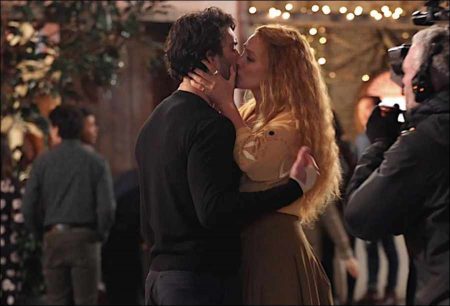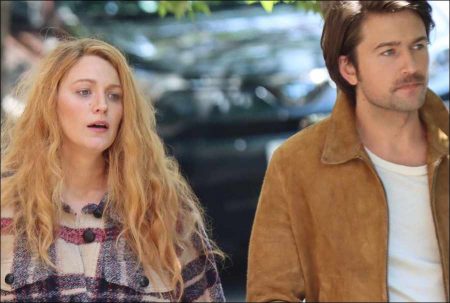Taglines: Sometimes it is the one who loves you who hurts you the most.
It Ends with Us, the first Colleen Hoover novel adapted for the big screen, tells the compelling story of Lily Bloom (Blake Lively), a woman who overcomes a traumatic childhood to embark on a new life in Boston and chase a lifelong dream of opening her own business. A chance meeting with charming neurosurgeon Ryle Kincaid (Justin Baldoni) sparks an intense connection,
but as the two fall deeply in love, Lily begins to see sides of Ryle that remind her of her parents’ relationship. When Lily’s first love, Atlas Corrigan (Brandon Sklenar), suddenly reenters her life, her relationship with Ryle is upended, and Lily realizes she must learn to rely on her own strength to make an impossible choice for her future.
It Ends with Us is an American romance film directed by Justin Baldoni and written by Christy Hall, based on the 2016 novel of the same name by Colleen Hoover. It stars Blake Lively and Baldoni. The film was originally set to be released theatrically on February 9, 2024, and June 21, 2024, but the release date was pushed back to August 9, 2024.

Film Review for It Ends with Us
Faithfulness is overrated. To be clear – lest I sound like some philandering husband in a John Updike novel – I don’t mean in a romantic sense. No, I’m talking about faithfulness in the world of film and TV: the idea that screen adaptations of books should mirror their source material as closely as possible. In the sickly modern age of “recognisable IP” and reboots of reboots of reboots, “faithfulness”, or fidelity to source material, is a towering dogma.
When it was announced, for instance, earlier this year, that an extravagant new Harry Potter TV series had been greenlit, the key selling point was that they would be more “faithful” to the original books. This is fine, of course: for many readers, the allure of a screen adaptation lies in seeing the world of a book brought to life. Why wouldn’t you want it as accurate as possible? But it is also an extremely limiting way of viewing the art of adaptation. And besides, what does it even mean to be “faithful” anyway?
This week, the first photos of actors Blake Lively and Justin Baldoni on the set of It Ends With Us made their way online. The film is an adaptation of a romance novel by the American writer Colleen Hoover, which traces a love affair between college graduate Lily Bloom (Lively) and abusive neurosurgeon Ryle Kincaid (Baldoni). And, boy, is it popular.
It Ends With Us was a bestseller after its publication in 2016, and went on to experience a heady surge in popularity two years ago after it began trending on the literature-oriented sphere of TikTok known as “BookTok”, topping the New York Times bestseller list over five years after it shelves. Over a million copies have been sold in the UK alone; last year in the US, Hoover outsold the Bible.
Yet the images of Lively and Baldoni in costume didn’t quite prompt the publicity frenzy producers may have hoped. Fans complained about the wardrobes of the characters. They complained about their wigs. They complained about the age discrepancies between the actors and their written counterparts (Lily is 23, Lively 35; Ryle is 30, Baldoni 39). “I think most of us were already not thrilled with this casting, but this is kind of confirming the fears,” one person wrote.
I would, however, argue that this is a narrow-minded stance to take. The tendency to pre-judge a project from an out-of-context leak is an unfortunate but inevitable side effect of the modern internet ecosystem. But even if the images are representative of the direction of the film, it doesn’t automatically spell doom. Adaptation is, after all, as much about the things an artist elects to change as those they decide to keep.
Changing, say, the characters’ ages – or how old they “read” on screen – naturally alters the story, but doesn’t necessarily worsen it. “Faithfulness” as a concept (as it applies to adaptation) also seems more spurious the closer you scrutinise it. After all, these characters only ever really exist in the mind’s eye; if a million people read It Ends With Us, there will exist a million “true” versions of Lily and Ryle, each slightly different, informed by each reader’s own subjective understanding of the writing.
Sometimes, unfaithful casting can lead to greatness. For instance: in the original Stephen King story upon which The Shawshank Redemption was based, the character of Red was a (white) Irish guy; in the movie adaptation, he is played by Morgan Freeman. The role became a signature one for Freeman, and his character a standout in what was, for many years, one of the most widely beloved dramas around.
The Shining; Blade Runner; Shrek: some of the best and most popular movies of all time have been the result of filmmakers taking massive liberties with the source material. What’s more, there have been occasions where first impressions were thoroughly upended. Remember the outcry when Renee Zellweger was cast in Bridget Jones’s Diary? “How could a Yank like her possibly embody Helen Fielding’s zeitgeisty British protagonist?” came the cry. Fast-forward to its release, and the question had become, “How could anyone else?”
Taken to its logical endpoint, this fixation with “faithfulness” also cuts off the potential for age- or race-blind casting. From Harry Potter and the Cursed Child to James Bond, to the forthcoming Percy Jackson and the Olympians adaptation, race-blind casting – or even, in 007’s case, the very suggestion of it – still has the potential to provoke outrage among audiences. Unravel these problematic (usually outright racist) complaints, and again you hit upon the fallacy of what exactly constitutes a “faithful” transposition. More often than not, it’s just a form of gatekeeping.
It Ends with Us (2024)
Directed by: Justin Baldoni
Starring: Blake Lively, Isabela Ferrer, Justin Baldoni, Brandon Sklenar, Alex Neustaedter, Jenny Slate, Hasan Minhaj, Daphne Zelle, Nahna James, Amy Morton, Suki Úna Rae, Sharleen Shayan
Screenplay by: Christy Hall
Production Design by: Russell Barnes, Annie Simeone
Film Editing by: Robb Sullivan
Costume Design by: Eric Daman
Set Decoration by: Carrie Stewart
Art Direction by: Marci Mudd, Annie Simeone
MPAA Rating: None.
Distributed by: Sony Pictures Releasing
Release Date: August 16, 2024
Views: 127





